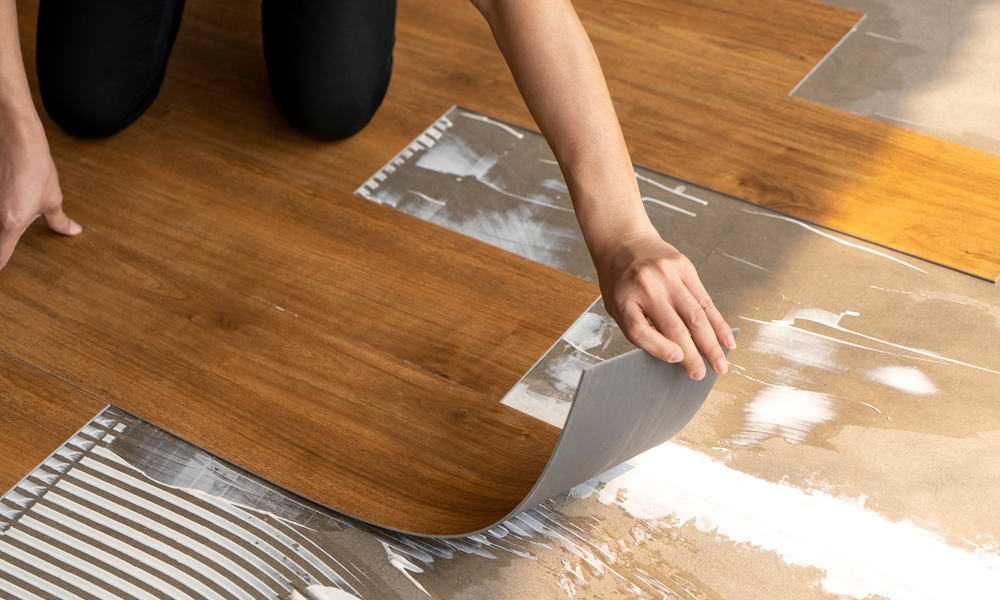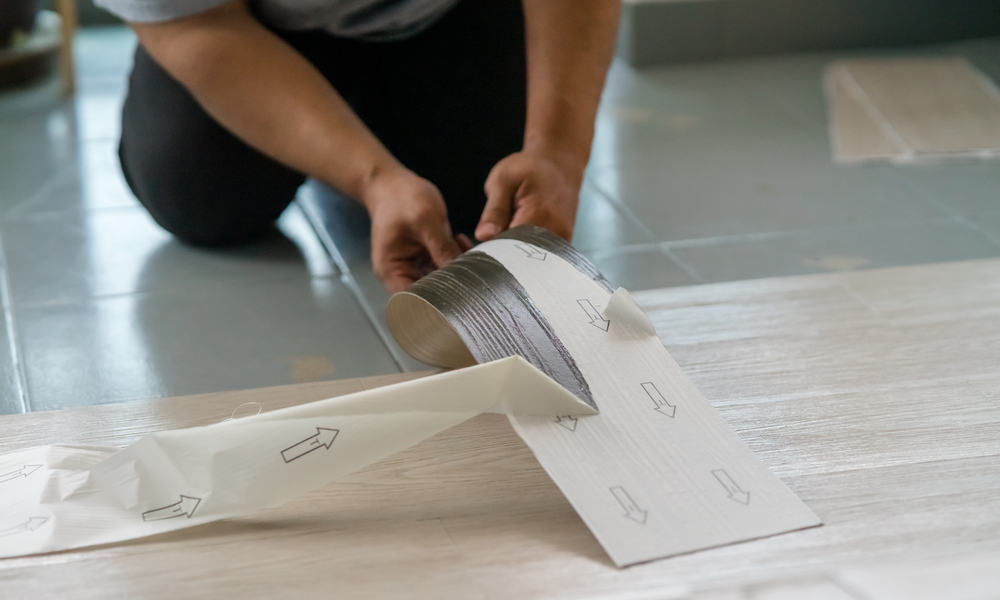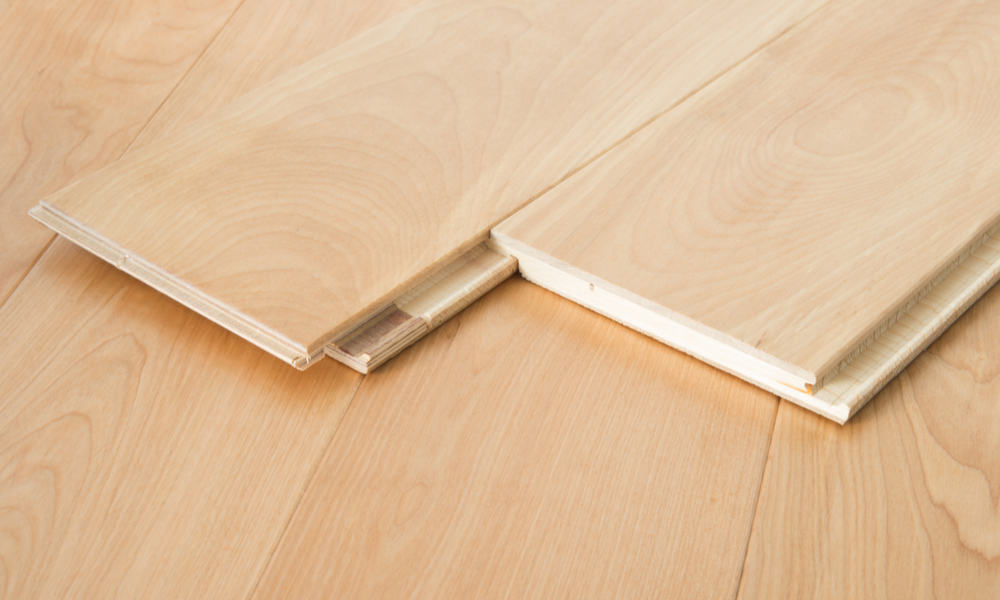Are you considering vinyl for your new floors? When shopping for vinyl flooring, you have two options: glue down and floating vinyl plank flooring. Both types come in diverse styles and designs to suit your taste, but there are also important advantages and disadvantages to consider before purchasing.
This guide will explain everything you need to know about glue down vinyl plank flooring vs. floating vinyl planks. In the end, you will be in a better position to choose the type of flooring that suits you best.
Let us first understand each of the two types of vinyl flooring, as well as their pros and cons.
Table of Contents
What Is Glue-Down Vinyl Plank Flooring?
Glue down vinyl flooring uses an adhesive to stick the planks to the subfloor. There are two types of glue down vinyl flooring: hard set and pressure-sensitive.
Hard set vinyl flooring is installed by applying a setting adhesive on a level subfloor. The planks adhere firmly, leaving the floor stable and capable of handling heavy items such as furniture without indenting or breaking.
Pros
- Durable – The hard set adhesive used to install this vinyl flooring is very strong. The planks can stay intact for years with little to no peeling, giving you a great return on your investment. That said, durability will also depend on how well the floor is installed.
- Easy repair and maintenance – Compared to interlocking floating planks (we will look at those in a bit), glue down flooring is easy to repair and replace. If one plank or tile is faulty, you only need to replace or repair that one without undoing the neighboring planks.
- Affordable – Hard-set vinyl flooring is not the cheapest option, but it is also not prohibitively expensive. You will get high-quality planks or tiles at pocket-friendly prices, allowing you to replace or build your new flooring affordably.
Cons
- Demanding installation – Installing glue down hard set flooring is more time and effort-intensive compared to other types of vinyl flooring. The process entails leveling the subfloor to near-perfection and applying the hard set glue to the floor using a trowel. A slight imbalance in the floor levelness can easily throw off the entire installation process.
Peel and stick glue-down flooring
Pressure-sensitive, also known as peel and stick, is the traditional option for glue-down flooring. The plank or tile itself has an adhesive at the back, and installation entails laying down the flooring and applying pressure to adhere. The advantage of pressure-sensitive vinyl flooring is the ease of replacement compared to hard-set vinyl flooring.
Pros
- Easy to install – Pressure-sensitive vinyl flooring is perfect for any DIYer. Even without any floor installation experience, you can install this yourself. Very little prep work is needed to get the subfloor ready; if your subfloor is level, you can install your peel and stick flooring immediately.
- Budget-friendly – If you want to spruce up your floors without breaking the bank, pressure-sensitive vinyl flooring is an excellent choice. You can easily change out your entire home’s floor and replace it with peel-and-stick vinyl on a small budget.
- Aesthetic appeal – Even though this flooring is just a sticker glued to your subfloor, it looks and feels just like real wood. At first sight, no one can tell the difference. You can enjoy the beauty of hardwood floors on a tight budget.
- Easy repair and maintenance – In addition to being easy to install, this vinyl flooring option is easy to repair, waterproof, and low maintenance. If you care for it properly, it can last you a long time as you wait to install permanent flooring.
Cons
- Low durability – Peel-and-stick vinyl flooring is mostly a temporary flooring solution. The adhesive can sometimes become weak, causing the flooring to peel off. This mostly happens if the subfloor was not prepared properly. It is a good choice if you are looking to change your existing floor quickly as you plan for a more permanent floor option.
- Too Thin – Pressure-sensitive vinyl flooring is the thinnest of all the vinyl flooring types. If there are any imperfections on the subfloor, you will feel them on the surface of the vinyl. It is absolutely important to thoroughly prepare the subfloor before installing glue-down flooring.
What is Floating Vinyl Plank Flooring?
Floating flooring has been the go-to vinyl flooring for residential and commercial buildings in the past 15 years, and it continues to be popular for a good reason. This flooring comes in two options: Loose lay and click vinyl flooring.
Let’s take a look at each option and its pros and cons.
Loose lay vinyl flooring
Loose lay flooring is installed on top of the subfloor without any adhesive or fastener. Different manufacturers have different installation instructions, but generally, loose lay flooring is installed by gluing down planks or tiles on the room’s outer edges to support the rest of the flooring installed in the middle. The tiles laid in the middle stay intact and are held by the glued-down perimeter tiles.
Click vinyl flooring
Click vinyl flooring is more popular due to its stability and sound suppressing quality. Also known as click and lock or luxury vinyl flooring, these planks feature a rigid core and a groove and lock mechanism that allows you to lock each plank to the next easily.
Pros
- Easy Installation – The click and lock and loose lay mechanism make for easy installation. With handy skills, installing a floating vinyl planks floor should be fuss-free. Because the planks sit on top of a subflooring, they will still look good and stable on a less than perfectly leveled subfloor.
- Durable – Floating vinyl plank flooring comes in thickness sizes of up to 6mm. Because of their thickness, these planks can last for years and still retain their stability and noise-reducing quality. Unlike glue-down vinyl flooring that can sometimes peel after prolonged use, floating floors don’t have issues with peeling and will rarely come apart if installed correctly. This flooring option is also waterproof.
Cons
- Repairs can be challenging – Because floating vinyl plank flooring interlocks, repairs can be quite difficult to do. If one plank is problematic, you would have to undo some of the surrounding planks to fix that one plank. The upside is that this type of flooring is hard-wearing and durable, and repairs are far and apart.
- Cost – Floating vinyl plank flooring is the most expensive of all the vinyl flooring options. Still, this flooring is affordable, and when you consider all the excellent benefits, you get a return on investment.
Choosing Between Glue Down Vs. Floating Vinyl Plank Flooring
In addition to the pros and cons we have looked at, there are some additional factors I recommend you keep in mind before settling for either glue down vinyl plank flooring or floating vinyl flooring.
Let us look at each below:
Do you want to DIY or have someone else do it?
Peel-and-stick vinyl flooring has the easiest installation process of all the vinyl flooring options. Both types of floating flooring also don’t require advanced skills to install.
Depending on your floor’s levelness, installing glue down hard set vinyl flooring may require a great deal of time and effort. You will have to level your floor, apply the hard set adhesive, and carefully lay the planks.
How large is the target room?
Some vinyl flooring options are better suited for small rooms, while others work well in larger rooms. Click-and-lock floating floors may not be the best for wide, open spaces.
The planks are prone to separating when installed in bigger rooms. Choose this flooring option for smaller spaces such as a kitchen, kids’ bedroom, or narrow hallways. Glue down flooring is more suitable for larger spaces as the planks are stuck to the floor and are less likely to separate.
Is the space prone to moisture?
Moisture can damage even the most professionally installed floor. Different vinyl flooring options have different levels of moisture tolerance. If you are looking to install new flooring in a basement or crawl space, consider a floating floor.
Since the interlocking floating planks do not touch the subfloor, they are less likely to suffer moisture damage. You can also install a moisture barrier for extra safety. On the other hand, moisture can weaken the adhesive in glue down flooring.
Is the space high-traffic or low traffic?
Your floor’s longevity will depend on how much traffic it is exposed to. Hard set vinyl flooring is the best choice for high traffic areas such as the kitchen, bathroom, and hallways, as the planks are firmly glued to the subfloor.
Floating flooring may easily come apart when installed in busy areas, although it offers greater elegance installed in any other part of the house.
Summary
Flooring can be a significant investment in renovating a small bathroom or upgrading your home’s entire floor. As such, you want to make smart decisions to get value for your money.
Our comparison of glue down vinyl plank flooring vs. floating flooring shows each has its strengths and weaknesses. Glue down flooring offer durability and a solid feel underfoot, but installation can be quite demanding.
Peel-and-stick flooring is a great option if you are on a tight budget, are looking for a temporary flooring solution, and don’t mind the sometimes lengthy installation process.
Lastly, floating flooring is easily the most elegant option. It is also relatively easy to install on your own. The price point might be comparably higher, but you do get a return on your investment.
I hope this side-by-side comparison helps you make a smart decision for your flooring project!



Excellent summary. I didn’t know it until I saw this, but I think glue-down will be our choice. We are removing very worn w-to-wall carpet in our living room and hallway. My husband has a heavy power chair (he and the chair weigh about 580 lbs) and he uses it everywhere in house. It sounds like we need glue-down simply to prevent separation and damage from the chair. And a maximal wear layer, since the chair sometimes brings in dirt and tiny stones from outdoors. Any ideas for us?